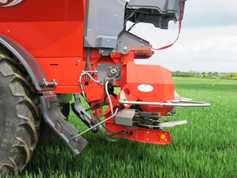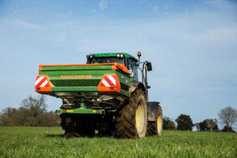Speaking on Thursday, 2 July, to the Oireachtas Joint Committee on Agriculture on the Beef Data and Genomics Programme (BDGP), Cromie said farmers' recording of differences in traits in suckler herds is just as important as recording carried out by the ICBF.
He clarified that both quantitative and qualitative data will be taken into account when rating cows for 4 or 5 stars, and that the latter form of data will come from the farmer.
"Quantitative data recording can be carried out by technical experts, but the qualitative data comes from the farmer," he said.
"Some people criticise that farmers just record anything," he continued.
"From our perspective this is a good thing. There needs to be consistency when recording and farmers can provide that because they are with their herd a lot more frequently than we are."
He said the main traits farmers can observe and record in their animals would be near impossible to record from the perspective of a person who is sent out to the farm for only a couple of hours.
"It costs roughly about €80 to send someone out to a farm, and then they're only there for a couple of hours," Cromie continued. "Without the farmer recording important data such as cow docility, calf quality and cow milk score, we wouldn't have a proportionate sense of what the herd was like."
Packs to record data under BDGP will start going out to farmers at the end of July/early August and in September farmers will tag animals and send them back so the process of genotyping can begin some time in early October. The ICBF representative said payments will be made to farmers once all that is done.
Cromie also said the ICBF hopes to be genotyping about 20,000 animals per week.
It was also confirmed at the meeting that farmers do not have to decide whether to remain in the scheme before the packs are sent out and that farmers will not be charged if they decide not to use the pack.
Structure of ICBF
Questions also arose during the meeting from Labour TD, Deputy Michael McNamara, in relation to the structure of ICBF and what the organisation stood to gain financially from the new scheme.
The ICBF's Sean Coughlan stressed the scheme was set up by the Department of Agriculture and that the ICBF only had some technical input into its design.
"We did not sign off on the scheme or approve it," he said.
He added that discussions of the issues between the ICBF and Department of Agriculture were confidential and they were not discussed at the board.
He also clarified for Deputy McNamara that the ICBF is an independent agency body - a cooperative non-profit agency - and that it will make no money out of this. This is a scheme concerned with "cost recovery," he said.
Coughlan added that the ICBF has 16 board members, 46% of which is owned by farmers with money held in trusts and 54% of which is owned by service providers such as AI providers.
"There is one member from the Department of Agriculture on the board although they do not have a stake in the organisation," he said.
Read more
Watch: Discussion on the Beef Data & Genomics Programme
Speaking on Thursday, 2 July, to the Oireachtas Joint Committee on Agriculture on the Beef Data and Genomics Programme (BDGP), Cromie said farmers' recording of differences in traits in suckler herds is just as important as recording carried out by the ICBF.
He clarified that both quantitative and qualitative data will be taken into account when rating cows for 4 or 5 stars, and that the latter form of data will come from the farmer.
"Quantitative data recording can be carried out by technical experts, but the qualitative data comes from the farmer," he said.
"Some people criticise that farmers just record anything," he continued.
"From our perspective this is a good thing. There needs to be consistency when recording and farmers can provide that because they are with their herd a lot more frequently than we are."
He said the main traits farmers can observe and record in their animals would be near impossible to record from the perspective of a person who is sent out to the farm for only a couple of hours.
"It costs roughly about €80 to send someone out to a farm, and then they're only there for a couple of hours," Cromie continued. "Without the farmer recording important data such as cow docility, calf quality and cow milk score, we wouldn't have a proportionate sense of what the herd was like."
Packs to record data under BDGP will start going out to farmers at the end of July/early August and in September farmers will tag animals and send them back so the process of genotyping can begin some time in early October. The ICBF representative said payments will be made to farmers once all that is done.
Cromie also said the ICBF hopes to be genotyping about 20,000 animals per week.
It was also confirmed at the meeting that farmers do not have to decide whether to remain in the scheme before the packs are sent out and that farmers will not be charged if they decide not to use the pack.
Structure of ICBF
Questions also arose during the meeting from Labour TD, Deputy Michael McNamara, in relation to the structure of ICBF and what the organisation stood to gain financially from the new scheme.
The ICBF's Sean Coughlan stressed the scheme was set up by the Department of Agriculture and that the ICBF only had some technical input into its design.
"We did not sign off on the scheme or approve it," he said.
He added that discussions of the issues between the ICBF and Department of Agriculture were confidential and they were not discussed at the board.
He also clarified for Deputy McNamara that the ICBF is an independent agency body - a cooperative non-profit agency - and that it will make no money out of this. This is a scheme concerned with "cost recovery," he said.
Coughlan added that the ICBF has 16 board members, 46% of which is owned by farmers with money held in trusts and 54% of which is owned by service providers such as AI providers.
"There is one member from the Department of Agriculture on the board although they do not have a stake in the organisation," he said.
Read more
Watch: Discussion on the Beef Data & Genomics Programme






 This is a subscriber-only article
This is a subscriber-only article











SHARING OPTIONS: